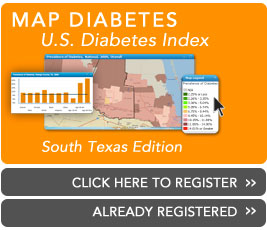Posted by Diabetes Rio Grande
News
Friday, February 5th, 2016

Ann Intern Med, 1 December 2015
Description: Update of the 2008 U.S. Preventive Services Task Force (USPSTF) recommendation on screening for diabetes in asymptomatic adults. …
Recommendation: The USPSTF recommends screening for abnormal blood glucose as part of cardiovascular risk assessment in adults aged 40 to 70 years who are overweight or obese. Clinicians should offer or refer patients with abnormal blood glucose to intensive behavioral counseling interventions to promote a healthful diet and physical activity Read more.
Posted by Diabetes Rio Grande
News
Friday, February 5th, 2016

Photo by DARPA
NIH Director’s Blog, 10 November 2015
In recent years, there’s been a lot of talk about how “Big Data” stands to revolutionize biomedical research. Indeed, we’ve already gained many new insights into health and disease thanks to the power of new technologies to generate astonishing amounts of molecular data—DNA sequences, epigenetic marks, and metabolic signatures, to name a few. But what’s often overlooked is the value of combining all that with a more mundane type of Big Data: the vast trove of clinical information contained in electronic health records (EHRs).
In a recent study in Science Translational Medicine, NIH-funded researchers demonstrated the tremendous potential of using EHRs, combined with genome-wide analysis, to learn more about a common, chronic disease—type 2 diabetes. Sifting through the EHR and genomic data of more than 11,000 volunteers, the researchers uncovered what appear to be three distinct subtypes of type 2 diabetes. Not only does this work have implications for efforts to reduce this leading cause of death and disability, it provides a sneak peek at the kind of discoveries that will be made possible by the new Precision Medicine Initiative’s national research cohort, which will enroll 1 million or more volunteers who agree to share their EHRs and genomic information. Read more.
Posted by Diabetes Rio Grande
News
Friday, February 5th, 2016
JAMA, 8 September 2015
Importance Chronic diseases have overtaken acute diseases, such as infections, as the major cause of premature mortality worldwide. Diabetes mellitus, a chronic degenerative metabolic disease, has reached epidemic proportions in the past 30 years, with worldwide prevalence approaching 400 million people. …
Conclusions and Relevance Improved glycemic control and better management of other identified risk factors for the complications of diabetes and more effective treatment of cardiovascular disease and microvascular complications have resulted in a more optimistic outlook for people with diabetes. This review focuses on recent advances in diagnosis and management and the remaining challenges in the prevention and treatment of diabetes mellitus. Read more.
Posted by Diabetes Rio Grande
News
Friday, February 5th, 2016
Prev Chronic Dis, 3 December 2015
Introduction
This study aimed to assess the trends in tooth loss among adults with and without diabetes mellitus in the United States and racial/ethnic disparities in tooth loss patterns, and to evaluate trends in tooth loss by age, birth cohorts, and survey periods. …
Conclusion
Substantial differences in tooth loss between adults with and without diabetes and across racial/ethnic groups persisted over time. Appropriate dental care and tooth retention need to be further promoted among adults with diabetes. Read more.
Posted by Diabetes Rio Grande
News
Friday, February 5th, 2016
Houston Public Media, 16 November 2015
Researchers at the University of Texas School Of Public Health say residents in certain parts of Houston are more vulnerable to getting diabetes.
The research is part of a project called Cities Changing Diabetes. Stephen Linder is a professor at the University of Texas School of Public Health. His team interviewed hundreds of residents across Greater Houston on their health habits and lifestyle. Read more.
Posted by Diabetes Rio Grande
News
Friday, February 5th, 2016
Houston Chronicle, 18 September 2015
A case of a 3-year-old, 77-pound Houston girl diagnosed with type 2 diabetes underscores a disturbing trend. Decades of rising childhood obesity rates in the United States have had a shadow effect, with a parallel increase in children developing the form of the disease that has mainly affected adults.
More children are being diagnosed with type 2 diabetes at an earlier age, studies show, prompting doctors to continually reframe their thinking about how early diabetes can start. A shortage of drugs for pediatric diabetes patients, and difficulty in enrolling children in trials, compounds the problem. Read more.
Posted by Diabetes Rio Grande
News
Friday, February 5th, 2016
Association of Schools and Programs of Pubic Health, 10%#160;September 2015
n South Texas, the human suffering and medical expenses of a third of the population living with type 2 diabetes is catastrophic. For people who have diabetes but lack medical coverage, it costs approximately $0.2 million per year for sporadic, intensive emergency room visits for dialysis during the last 3 years of life.
In hopes of reversing this trend, Dr. Ann Millard, will begin a walking group and healthy eating program led by promotoras de salud (Community Health Workers) in the colonias of Weslaco, Texas. An associate professor at the Texas A&#amp;M Health Science Center School of Public Health McAllen Campus, Millard will continue her work through a 2-year $342,000 grant awarded from the Knapp Community Care Foundation. Read more.





























